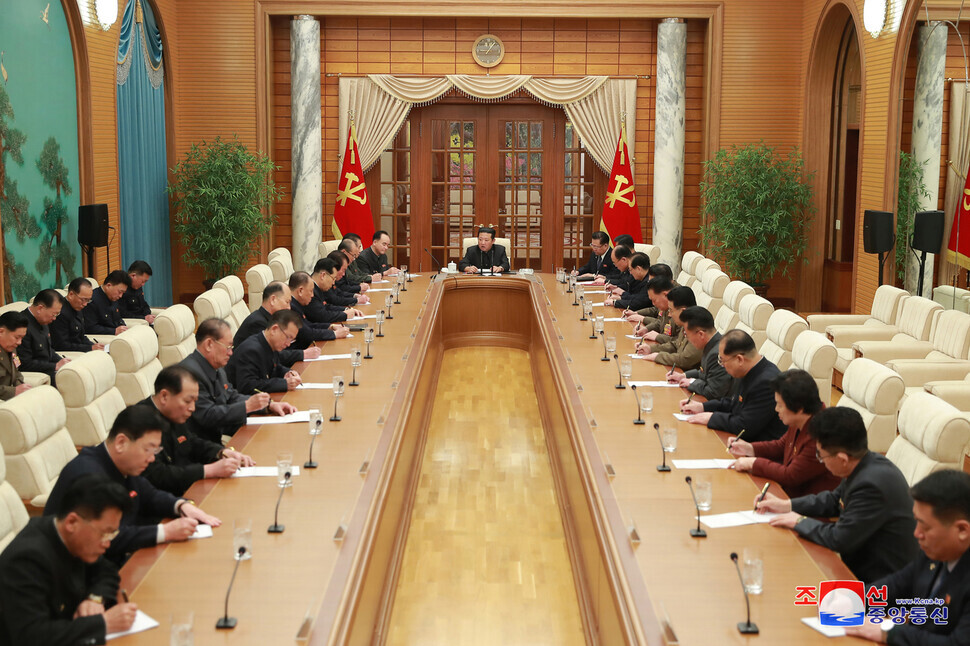hankyoreh
Links to other country sites 다른 나라 사이트 링크
N. Korea publicly acknowledges first COVID-19 outbreak

North Korean authorities formally announced Thursday that the Omicron variant of the COVID-19 virus had been detected in North Korea.
This marks the first time that authorities in Pyongyang have officially acknowledged and disclosed any confirmed COVID-19 cases, after declaring North Korea to have “zero” cases ever since its national borders were sealed on Jan. 30, 2020.
The Korean Central News Agency (KCNA) reported Thursday that a decision to “switch over from the state epidemic prevention system to the maximum emergency epidemic prevention system” had been made following the occurrence of COVID-19 infections, which was reported at the 8th Politburo meeting of the 8th Central Committee of Workers’ Party of Korea (WPK) presided over at the committee’s headquarters that morning by leader Kim Jong-un.
“The state emergency epidemic prevention command and relevant units made deliberation of the result of strict gene arrangement analysis on the specimen from persons with fever of an organization in the capital city on May 8, and concluded that it coincided with Omicron BA.2 variant which is recently spreading worldwide rapidly,” the KCNA reported on the meeting’s outcome.
“A break was made on our emergency epidemic prevention front,” the report read, calling the situation a “most serious emergency case of the state.”
At the same time, Kim was quoted as saying that “there should be nothing missed in the planned economic work” and calling for “all the cities and counties of the whole country to thoroughly lock down their areas and organize work and production after closing each working unit, production unit and living unit from each other.”
His instructions indicate that in response to the unprecedented discovery of confirmed COVID-19 cases, he plans to continue with production, business, and normal living activities amid bans on movement between regions and contact with the outside, rather than implementing a full-scale lockdown.
The question of whether the North’s disease control measures will be revised appears likely to be reexamined after “convening the 5th Plenary Meeting of the 8th Central Committee of the Party in the first third of June” based on the Politburo’s decision.
During his confirmation hearing that day before the National Assembly Foreign Affairs and Unification Committee, Kwon Young-se, the nominee to lead South Korea’s Ministry of Unification, was asked by People Power Party lawmaker Chung Jin-suk whether he intended to “use vaccine assistance to North Korea as a means of creating momentum for inter-Korean dialogue.”
“Of course,” he replied.
“We intend to actively help the North in its difficulties. There is already a Ministry of Unification budget drawn up, and once I am sworn in, I will actively explore plans for cooperation,” he continued.
In a position statement on the occurrence of a COVID-19 case in North Korea, the office of the Ministry of Unification’s spokesperson said, “This administration is willing to undertake support for the North Korean public and inter-Korean cooperation of disease control and healthcare at any time in the interests of humanitarianism, and if there are any areas that require inter-Korean cooperation or cooperation with the international community going forward, we will actively explore them.”
By Lee Je-hun, senior staff writer; Jung In-hwan, staff reporter
Please direct questions or comments to [english@hani.co.kr]

Editorial・opinion
![[Column] Park Geun-hye déjà vu in Yoon Suk-yeol [Column] Park Geun-hye déjà vu in Yoon Suk-yeol](https://flexible.img.hani.co.kr/flexible/normal/500/300/imgdb/original/2024/0424/651713945113788.jpg) [Column] Park Geun-hye déjà vu in Yoon Suk-yeol
[Column] Park Geun-hye déjà vu in Yoon Suk-yeol![[Editorial] New weight of N. Korea’s nuclear threats makes dialogue all the more urgent [Editorial] New weight of N. Korea’s nuclear threats makes dialogue all the more urgent](https://flexible.img.hani.co.kr/flexible/normal/500/300/imgdb/original/2024/0424/7317139454662664.jpg) [Editorial] New weight of N. Korea’s nuclear threats makes dialogue all the more urgent
[Editorial] New weight of N. Korea’s nuclear threats makes dialogue all the more urgent- [Guest essay] The real reason Korea’s new right wants to dub Rhee a founding father
- [Column] ‘Choson’: Is it time we start referring to N. Korea in its own terms?
- [Editorial] Japan’s rewriting of history with Korea has gone too far
- [Column] The president’s questionable capacity for dialogue
- [Column] Are chaebol firms just pizza pies for families to divvy up as they please?
- [Column] Has Korea, too, crossed the Rubicon on China?
- [Correspondent’s column] In Japan’s alliance with US, echoes of its past alliances with UK
- [Editorial] Does Yoon think the Korean public is wrong?
Most viewed articles
- 1[Column] Park Geun-hye déjà vu in Yoon Suk-yeol
- 2N. Korean hackers breached 10 defense contractors in South for months, police say
- 3Will NewJeans end up collateral damage in internal feud at K-pop juggernaut Hybe?
- 4Kim Jong-un expressed ‘satisfaction’ with nuclear counterstrike drill directed at South
- 5[Editorial] New weight of N. Korea’s nuclear threats makes dialogue all the more urgent
- 6[Cine feature] A new shift in the Korean film investment and distribution market
- 7[Column] ‘Choson’: Is it time we start referring to N. Korea in its own terms?
- 8[Column] The clock is ticking for Korea’s first lady
- 9[Editorial] Japan’s rewriting of history with Korea has gone too far
- 10Thursday to mark start of resignations by senior doctors amid standoff with government